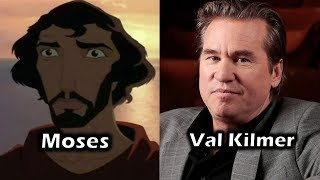"The Prince of Egypt," produced by Dreamworks Animation in 1998, remains a significant portrayal of the biblical Exodus story. The film's handling of Jewish representation, while commendable in many aspects, raises pertinent discussions about both its positive and negative facets. In the context of the late '90s, this depiction was a necessary step in representing a significant biblical narrative on the big screen. However, one notable critique revolves around the casting choices, where several Jewish characters were voiced by individuals not of Jewish descent.
Positively, the film aimed to honor and represent the essence of the Exodus story, a foundational tale within Judaism. It brought to life iconic figures like Moses and Rameses, intertwining their lives with emotional depth. The animation and storytelling were respectful and sought to capture the spiritual and cultural essence of the narrative, resonating strongly with Jewish audiences. The film's production team collaborated extensively with scholars and religious leaders, ensuring an authentic portrayal of the biblical tale, which added to its cultural significance.
Conversely, one of the critical points of contention was the casting choices. In a movie based on a significant biblical narrative from Jewish history, the decision to cast predominantly non-Jewish actors to voice Jewish characters raised concerns. This practice diverted from the essence of authentic representation, limiting opportunities for Jewish actors in roles that held cultural and religious significance. The industry's habitual preference for casting white actors to voice characters of diverse ethnicities and cultures perpetuated a systemic issue of underrepresentation and limited authentic cultural portrayal.
At its release, "The Prince of Egypt" was a milestone in bringing a biblical story to a mainstream audience, shedding light on Jewish culture and heritage. Yet, the casting choices detracted from the authenticity of representation. In the situation of Val Kilmer playing Moses, his shade of skin barely matches who they're playing in this interpretation. In an era where the film industry was beginning to grapple with questions of cultural representation and diversity, this movie stands as a testament to both its ambition and the challenges it faced in fully honoring the narrative's cultural roots.
Ultimately, while "The Prince of Egypt" succeeded in bringing a revered biblical story to the animated screen with visual splendor and emotional depth, it also highlighted the industry's ongoing struggle with authentic representation. The movie's impact and significance cannot be understated, but it also serves as a reminder of the importance of genuine representation in casting, ensuring that cultural and ethnic voices are accurately portrayed and heard.





No comments:
Post a Comment